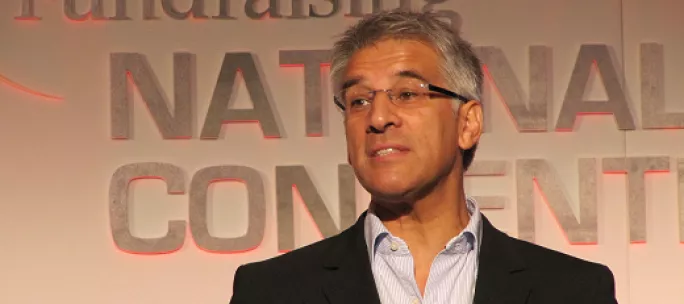‘We don’t believe in the term “superhead” - the disadvantaged don’t need rescuing’
Steve Chalke, founder of the Oasis charity and academy chain, writes:
It was autumn 1985. Oasis, the charity I founded, had just begun. From the start, the Oasis emphasis was to work with young people and whole communities, not just here in the UK, but globally. One of our very first projects was to drill wells in remote Indian villages to help people access clean, fresh water.
The Live Aid concert, organised by Bob Geldof and Midge Ure to raise funds for relief of the ongoing Ethiopian famine, had taken place a month or so earlier, and so it happened that Oasis was born into, and involved from the start, in a very important debate in the world of aid and development about what people now call the “pornography of poverty”.
Graphic pictures of emaciated Ethiopian infants with distended bellies, appealed to donors, but turned children, indeed, whole communities into freak shows. All this was far too reminiscent of the infamous Bethlem Royal Hospital, which in 18th-century England - with its bastardised nickname “Bedlam” - became a popular destination on the London tourist trail. Not only did it provide tens of thousands of visitors each year with free or cheap entertainment and “moral” education - the lesson being “if you live a corrupt and lazy life this is how you will end up”, it became a universal synonym for chaos, confusion, squalor and lunacy.
Thankfully, in the 30 years that has passed since then, the world of aid and development has come a long way. Non-governmental organisations and charities have come to realise that super-emotive imagery and sound bites depicting people as “sufferers” who need “rescuing” are voyeuristic and dehumanising. Anything that portrays a poor and struggling “them” in need of saving by a wealthy and well-adjusted “us” is not only patronising but, in the end, misguided. It prevents us from even recognising, let alone coming to grips with, the deeper issues that await our attention.
But, however much things might be changing in terms of our mind set around international development, it has become increasingly clear to me that the language of superheroics is alive and well far closer to home. And that is why I’m writing.
A week ago, an article about one of our senior leaders within Oasis, and his work as our principal at two of our academies, appeared in a newspaper.
The principal in question was not interviewed by the paper. Instead, it was stitched together on the basis of his answers at a Q&A session to other headteachers around the country. The tone of the piece contained notes of drama and heroism, which at times ran the risk of talking down the communities that Oasis considers itself a part of.
This worried me because by using the language of hero and rescue, the piece had managed to talk about the work of Oasis at the same time as totally misinterpreting the very reason that Oasis exists.
On 4 January this year, Oasis became responsible for a school on James Turner Street in Birmingham, which is now known as Oasis Academy Foundry. On that same day, Channel 4 broadcast the first episode of Benefits Street - a fly-on-the-wall documentary that, in our view, distorted and misrepresented life on James Turner Street, demonised a small number of its residents, and has left a harmful legacy hanging over the whole community.
Given that I know the real story of that street - and recognise that, like any other, it is a community of diversity, filled with tales of challenge, opportunity and success - I, and everyone else within Oasis, was saddened and angered by the twisted version of “reality” which in the end was far more about voyeurism and the audience figures it generates than truth.
The reality is, as soon as we use language that labels people as “other”, however well intentioned, we rob them of a piece of their humanity. In the long term, it leaves people feeling disenfranchised. In the short term, it creates the opportunity for people like Love Productions (the company that made Benefits Street) to step in and stigmatise whole communities.
Oasis does not believe in a culture of “them” and “us”, “hero” and “rescue”. This shallow rhetoric, which sadly still creeps into the language of some educationalists is, for all its good intentions, rooted in the same soil as “poverty porn”. It leaves people feeling disenfranchised and has the power to stigmatise whole communities.
At Oasis, we often say that we never come to do things “for” people, which patronises them. Or “to” people, which disempowers them, but always “with” people - only this will empower them. We are not the hero who rides in over the hill to turn things around.
We do not believe in “superheads” and heroic individualism where the powerful lift the poor out of their poverty through their benevolence. This is the stuff of Greek mythology, not everyday reality. Indeed, we are convinced that this approach and language has no place in modern education or the building of any sustainable communities. Its shortcomings and dangers are all too obvious.
Instead we believe that leadership is about servanthood, honesty and interdependency; each and every one of us has strengths and weaknesses. We have learnt that team work, with each and every staff member and student believing in themselves and pulling together to make the difference is what counts. And that, in the end, it is the only path to real transformation.
Keep reading for just £1 per month
You've reached your limit of free articles this month. Subscribe for £1 per month for three months and get:
- Unlimited access to all Tes magazine content
- Exclusive subscriber-only stories
- Award-winning email newsletters




